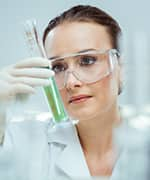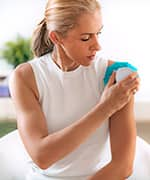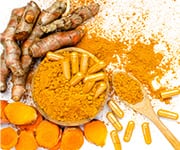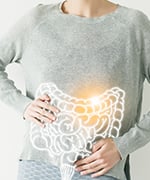Life Extension Magazine®
Some nutrients can reduce existing inflammation, while others may help resolve inflammation.
Winding down the flow of inflammation at its source is vital to maintain healthy, functional tissues.1
Compounds that actively promote the resolution of inflammation are known as specialized pro-resolving mediators or SPMs.2
A clinical study published in 2022 demonstrates that taking SPM precursors along with bioavailable curcumin deliver significant relief of pain and discomfort.3
In just 30 days, the combination significantly reduced:
- Total pain,
- Pain intensity, and
- Pain severity.
After 60 days, a remarkable 79% of participants had an improvement in total pain.
New Human Study
Curcumin, a compound found in the turmeric plant, is well-established as a particularly powerful anti-inflammatory and an important nutrient to reduce inflammation.4,5
Specialized pro-resolving mediators (SPMs) are compounds produced in the body that resolve inflammation, helping return inflamed tissues back to their healthy state.2
Scientists wondered whether combining SPM precursors with curcumin might more thoroughly reduce inflammation and thus have an impact on pain.
A 2022 open-label clinical pilot study recruited healthy male and female adults with mild to moderate pain.3
Every day for 60 days, 29 participants were asked to take:
- One softgel containing 500 mg of a marine oil enriched with three SPM precursors, and
- One capsule containing 500 mg of a highly bioavailable (absorbable) curcumin.
- Participants completed three well-known questionnaires used to measure pain, quality of life, and overall health:
- Short-Form McGill Pain Questionnaire ( SF-MPQ),
- Short-Form 36 Health Survey ( SF-36), and
- Medical Symptoms Questionnaire ( MSQ).
Compelling Results
The results of the study were published in Translational Medicine Communications, a peer- reviewed medical journal.
The SF-MPQ (Short-Form McGill Pain Questionnaire) responses showed significant improvements in all aspects of the questionnaire within 30 days, especially in:3
- Total pain,
- Pain intensity, and
- Pain severity.
The SF-36 (Short-Form 36 Health Survey) questionnaire showed significant improvements in:3
- Four aspects of physical health, especially pain and physical function, and
- Perceived health change.
The MSQ (Medical Symptoms Questionnaire) results showed:3
- Significant reduction in joint/muscle pain.
An impressive 62% of participants had an improved total pain score at 30 days, and 79% of participants showed improvement in total pain at 60 days.
No adverse events were reported.3
This strongly suggests that taking SPM precursors with a bioavailable form of curcumin delivers significant relief of pain and discomfort associated with inflammation.
Difference Between Anti-Inflammatories and SPMs
Curcumin and SPM precursors target inflammation in completely different ways.
Curcumin and other anti-inflammatories work to reduce body inflammation levels.
This is helpful but not enough to completely restore health, since inadequate resolution can lead to chronic inflammation, excessive tissue damage, and dysregulation of tissue healing, and may also lead to fibrosis.6
Hence, inflammation needs to be resolved, to get tissues back to their healthy, functional state.
Resolution of inflammation is a complex, active process guided by specific signaling compounds produced in the body.7,8 Among these compounds are specialized pro-resolving mediators.
How SPMs Resolve Inflammation
SPM precursors are predominantly derived from EPA and DHA, the omega-3 fatty acids found in fish oil.
The precursors needed to produce SPMs in the body include:9
- 18-HEPE (18-hydroxyeicosapentaenoic acid),
- 17-HDHA (17-hydroxydocosahexaenoic acid), and
- 14-HDHA (14-hydroxydocosahexaenoic acid).
The marine-blend softgels used in the 2022 study provided a total of 300 mcg of these three SPM precursors.3
These precursors are converted in the body into three different types of SPMs: resolvins, protectins, and maresins.3,10
These make up the bulk of the SPMs that target inflammation. They do so through three mechanisms:10-12
- Removing dead and dying cells, helping to clean up the aftermath of inflammatory cascades,
- Restoring inflammation balance by decreasing pro-inflammatory mediators and increasing anti-inflammatory compounds, and
- Renewing damaged tissue by promoting cellular regeneration.
What you need to know
Targeting Inflammation to Stop Pain
- Inflammation is a major risk factor for age-related disease and degenerative disorders. It is also a source of pain.
- Curcumin is a well-known anti-inflammatory, working to reduce inflammation.
- Other compounds called specialized pro-resolving mediators (SPMs) resolve inflammation, shutting off inflammation and returning tissues to a healthy state.
- A new clinical trial shows that combining a highly bioavailablecurcumin with marine oil enriched with SPM precursors significantly reduces subjective levels of pain and discomfort.
Evidence for Curcumin and SPM Benefits
Before researchers tested the combined effects of SPM precursors and curcumin, many studies had shown that each had benefits alone.
SPMs
Animal data showed promising results from the use of SPMs, including improvements in obesity-related osteoarthritis13 and in inflammation-induced neuropathic pain.14
A clinical trial found that oral intake of omega-3s increased SPM levels in the body by 229% and significantly lowered levels of the inflammatory marker C-reactive protein.15
Another clinical study showed that taking marine oil enriched with a combination of SPM precursors (including 18-HEPE, 17-HDHA, and 14-HDHA) increased SPM levels and helped resolve inflammation.16
Curcumin
Curcumin is known for the curcuminoids and polyphenols found in the turmeric plant.17
A meta-analysis of eight human trials involving 606 patients found that curcuminoids significantly reduced pain severity from a variety of causes, including arthritis and muscle soreness.18
Another review paper concluded that curcumin was safe and has significant anti-inflammatory activity.5
Combining SPM precursors with a powerful anti-inflammatory like curcumin targets inflammation in multiple ways and results in clear pain reduction.
Summary
Curcumin is a powerful anti-inflammatory that reduces existing inflammation.
Specialized pro-resolving mediators (SPMs) help resolve inflammation, guiding tissues back to their healthy state.
A new human study shows that combining marine oil enriched with SPM precursors with a highly bioavailable curcumin improves subjective measures of pain and discomfort associated with inflammation.
Building a Better Curcumin
Due to poor bioavailability, a large portion of curcumin taken orally never gets into the bloodstream or reaches tissues.
In a major advance, scientists combined curcumin with a fiber called galactomannan that protects curcumin in the gut.
Clinical research demonstrates that taking the curcumin-galactomannan combination results in blood levels of free curcuminoids that are over 45-times greater than in those who take pure curcumin alone.19
If you have any questions on the scientific content of this article, please call a Life Extension Wellness Specialist at 1-866-864-3027.
References
- Livshits G, Kalinkovich A. Inflammaging as a common ground for the development and maintenance of sarcopenia, obesity, cardiomyopathy and dysbiosis. Ageing Res Rev. 2019 Dec;56:100980.
- Kraft JD, Blomgran R, Lundgaard I, et al. Specialized Pro-Resolving Mediators and the Lymphatic System. Int J Mol Sci. 2021 Mar 9;22(5).
- Jaja-Chimedza A, Hirsh S, Bruce D, et al. The effects of an SPM-enriched marine oil and bioavailable curcumin combination on inflammation-associated discomfort in generally healthy individuals: a virtual open-label pilot study. Translational Medicine Communications. 2022 2022/11/14;7(1):25.
- Chandran B, Goel A. A randomized, pilot study to assess the efficacy and safety of curcumin in patients with active rheumatoid arthritis. Phytother Res. 2012 Nov;26(11):1719-25.
- Hewlings SJ, Kalman DS. Curcumin: A Review of Its Effects on Human Health. Foods. 2017 Oct 22;6(10).
- Sugimoto MA, Sousa LP, Pinho V, et al. Resolution of Inflammation: What Controls Its Onset? Front Immunol. 2016;7:160.
- Krishnamoorthy N, Abdulnour RE, Walker KH, et al. Specialized Proresolving Mediators in Innate and Adaptive Immune Responses in Airway Diseases. Physiol Rev. 2018 Jul 1;98(3):1335-70.
- Serhan CN, Chiang N, Dalli J. New pro-resolving n-3 mediators bridge resolution of infectious inflammation to tissue regeneration. Mol Aspects Med. 2018 Dec;64:1-17.
- Norling LV, Ly L, Dalli J. Resolving inflammation by using nutrition therapy: roles for specialized proresolving mediators. Curr Opin Clin Nutr Metab Care. 2017 Mar;20(2):145-52.
- Serhan CN. Treating inflammation and infection in the 21st century: new hints from decoding resolution mediators and mechanisms. FASEB J. 2017 Apr;31(4):1273-88.
- Serhan CN. Pro-resolving lipid mediators are leads for resolution physiology. Nature. 2014 Jun 5;510(7503):92-101.
- Serhan CN. Discovery of specialized pro-resolving mediators marks the dawn of resolution physiology and pharmacology. Mol Aspects Med. 2017 Dec;58:1-11.
- Sun AR, Wu X, Liu B, et al. Pro-resolving lipid mediator ameliorates obesity induced osteoarthritis by regulating synovial macrophage polarisation. Sci Rep. 2019 Jan 23;9(1):426.
- Serhan CN, Dalli J, Karamnov S, et al. Macrophage proresolving mediator maresin 1 stimulates tissue regeneration and controls pain. FASEB J. 2012 Apr;26(4):1755-65.
- Norris PC, Skulas-Ray AC, Riley I, et al. Identification of specialized pro-resolving mediator clusters from healthy adults after intravenous low-dose endotoxin and omega-3 supplementation: a methodological validation. Sci Rep. 2018 Dec 21;8(1):18050.
- Souza PR, Marques RM, Gomez EA, et al. Enriched Marine Oil Supplements Increase Peripheral Blood Specialized Pro-Resolving Mediators Concentrations and Reprogram Host Immune Responses: A Randomized Double-Blind Placebo-Controlled Study. Circ Res. 2020 Jan 3;126(1):75-90.
- Rao PS, Ramanjaneyulu YS, Prisk VR, et al. A Combination of Tamarindus indica seeds and Curcuma longa Rhizome Extracts Improves Knee Joint Function and Alleviates Pain in Non-Arthritic Adults Following Physical Activity. Int J Med Sci. 2019;16(6):845-53.
- Sahebkar A, Henrotin Y. Analgesic Efficacy and Safety of Curcuminoids in Clinical Practice: A Systematic Review and Meta-Analysis of Randomized Controlled Trials. Pain Med. 2016 Jun;17(6):1192-202.
- Kumar D, Jacob D, Subash PS, et al. Enhanced bioavailability and relative distribution of free (unconjugated) curcuminoids following the oral administration of a food-grade formulation with fenugreek dietary fibre: a randomised double-blind crossover study. J Funct Foods. 2016;22:578-87.








